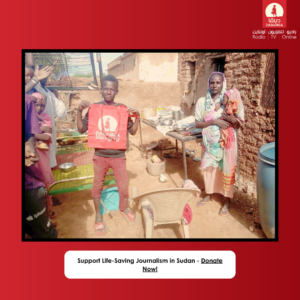‘World Radio Day’: Darfur stations struggle to survive

World Radio Day 2024 (Graphic: UNESCO)
Every year on February 13, radio stations worldwide are celebrated on World Radio Day. This year, there is little to celebrate in Darfur, as broadcasters reel from the damage they have sustained against the backdrop of the ongoing war between the Sudanese Armed Forces (SAF) and the paramilitary Rapid Support Forces (RSF) since April 15. As a radio station founded in Darfur, Dabanga shines a spotlight on some of the most affected stations.
One such station is Radio Nyala, based in the eponymous capital of South Darfur, which was established in 1983 and is one of the oldest in the region. Radio Nyala persisted with its radio coverage of the war for its listeners in Darfur, Kordofan, and neighbouring countries. However, its studios and medium-wave transmitter were destroyed amidst the fighting, and its work capacity reduced by half.
In an interview with Dabanga, Adam Hasan, the head of the broadcast engineering department at the South Darfur Radio and Television Corporation, explained that “in a systematic and deliberate manner, Radio Nyala sustained a level of sabotage that could not be restored”. The station, which was reconstructed in 2008 at a cost of more than SDG2 million, “would be impossible to rebuild in the current economic conditions“.
“Colleagues are witness to the extent of systematic destruction, and there is no glimmer of hope for Radio Nyala to be restored”, radio presenter Mahdi El Azib told Dabanga. The radio transmitter in Karari, a southern suburb in Nyala, was plundered along with the Radio Nyala studio.
“After 40 years of operations, there is no hope for the return of Radio Nyala despite our best efforts.”
Since war erupted between the SAF and RSF on April 15, Nyala has regularly witnessed fierce battles for the control of the strategically and economically important city in the region. Fierce fighting broke out in Nyala in late October of last year, during which the RSF took over the main SAF garrison in the city and declared its control over South Darfur.
The city was plunged into ‘medieval abyss’ due to a complete breakdown in mobile phone and internet connections since the early days of the war.
Radio Zalingei
In the capital of Central Darfur, Radio Zalingei resumed broadcasting after a seven-month hiatus, due to the extent of destruction it sustained during the war.
Journalist Shaimaa Haren said that the station was among the public institutions destroyed by fighting in the city, “but we were thankfully able to restore operations and repair the damage thanks to the efforts of grassroots organisations in Zalingei”.
Radio Zalingei was forced to relocate its offices and reduce its on-air time from five hours to three hours a day, given the departure of many of its employees from Central Darfur after fighting broke out in the state.
Haren described World Radio Day celebrations this year as “tepid”.
At the end of October last year, the RSF captured the base of the 21st Division of the SAF in Zalingei following months of fighting, effectively gaining control over the Central Darfur capital.
On February 6, Dabanga reported on the “disastrous” humanitarian situation in Zalingei.
‘Like any other day’
While other radio stations in Darfur were not infrastructurally affected by the ongoing war, many had to cease operations for months due to the unstable security conditions.
Radio El Fasher, in the North Darfur capital, is broadcasting two hours a day, following a months-long hiatus due to the lack of fuel and liquidity, according to the North Darfur Radio and Television Director Essameldin Hamed.
“We did not celebrate World Radio Day as usual, it passed like any other day”, said radio presenter Hamida Ahmed from El Geneina, the capital of West Darfur. “West Darfur Radio is now operating on a two-hour broadcast schedule, one hour in the morning and one in the evening”.
In a call with Dabanga, West Darfur Radio and Television Director Noureldin Bargou lamented the state of radio stations in Darfur. Only 25 out of a total of 90 radio workers were still present in the El Geneina, said Bargou, who was forced to flee to Chad due to fighting. “West Darfur Radio was able to maintain its audio library, archives, and broadcasting and transmitting equipment, hence it being able to resume its operations”.
Every year, radio workers around the world celebrate World Radio Day on February 13, which was declared by United Nations Educational, Scientific and Cultural Organisation (UNESCO) in 2011, and formally adopted by the UN General Assembly resolution 124/67 in 2013.
Journalists and media professionals have suffered disproportionately from violations and displacement since the start of the current Sudan conflict. Last September, a joint statement by 17 Sudanese media institutions and press organisations, including Dabanga, highlighted the critical state of press freedom in Sudan.











 and then
and then